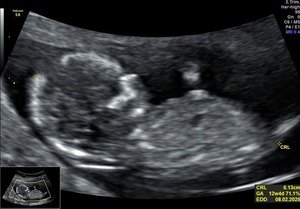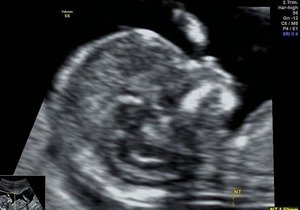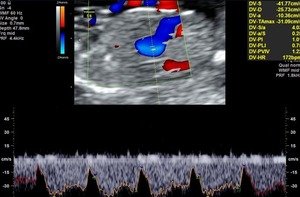NUCHAL TRANSLUCENCY SCAN / NT SCAN
THE VITAL FIRST TRIMESTER SCREENING TEST
ALL YOUR QUESTIONS ANSWERED
If you’re pregnant, understanding prenatal tests like the Nuchal Translucency Scan (NT Scan) is vital for an optimal, healthy outcome. This guide answers common questions about the NT scan to ensure you are well-informed about its purpose, procedure, significance and limitations.
- What is a Nuchal Translucency Scan (NT Scan)
The NT scan is a specialized ultrasound performed in the first trimester to assess the risk of chromosomal abnormalities, such as Down syndrome (Trisomy 21), Edwards syndrome (Trisomy 18), and Patau syndrome (Trisomy 13). It is done by measuring the thickness or fluid at the back of the baby’s neck.
- When is the NT Scan Done?
The scan is typically done between 11 weeks and 14 weeks of pregnancy when the baby’s anatomy and fluid levels are most suitable for measurement. The size of the fetus or CRL- the Crown Rump Length (head to bottom length) should be in the range of 45-84mm
- Why is the NT Scan Important?
The NT scan identifies potential risks for chromosomal abnormalities and structural abnormalities early, allowing for timely follow-up tests as needed.
- What Does this Scan Measure?
It measures the nuchal translucency thickness, the fluid at the back of the baby’s neck, and can include assessments of the fetal nasal bone, ductus venosus, tricuspid flow, and fetal heart rate.
- Is the NT Scan Mandatory?
No, the it is not mandatory. It’s offered to all pregnant women as part of prenatal care. This scan is however highly recommended in view of the vital information obtained
- How is this Scan performed?
This scan uses high resolution ultrasonography, it performed abdominally or transvaginally. A probe captures detailed images of the baby, and the procedure is painless. A transvaginal scan may be a little uncomfortable but it is generally painless.
- Is the NT Scan Safe?
Yes, the NT scan is non-invasive and safe. It uses sound waves to create images, posing no harm to you or your baby. Radiation is not used
- What is a Normal NT Measurement?
A normal measurement is typically less than 3 mm, though this may vary depending on gestational age. There is a normal range for every gestational age.
- What Happens if the NT Measurement is High?
If the measurement is high, your doctor may recommend additional tests, such as non-invasive prenatal testing (NIPT) or chorionic villus sampling (CVS), or amniocentesis.
- Does an Abnormal NT Scan Confirm a Problem?
No, an abnormal NT scan indicates a higher risk for chromosomal abnormalities but is not a definitive diagnosis. Follow-up testing is required for confirmation.
- Can this Scan Detect All Birth Defects?
No, the NT scan primarily screens for chromosomal abnormalities and some structural abnormalities. It cannot detect all birth defects.
- Why is the nasal bone evaluated?
The presence or absence of the nasal bone during the scan can further refine the risk assessment for conditions like Down syndrome. It improves the accuracy of the screening test.
- What is the Purpose of Ductus Venosus Flow Measurement?
The scan evaluates blood flow through the ductus venosus to check for heart function and risk of chromosomal abnormalities.
- Why is Tricuspid Flow Important?
Tricuspid flow assesses blood flow through the tricuspid valve in the fetal heart. Abnormal flow is an indicator of chromosomal abnormalities or heart defects.
- Is this Scan Combined with Other Tests?
The NT scan is often paired with a blood test known as the double marker test measuring markers like hCG and PAPP-A, increasing the accuracy of chromosomal abnormality detection.
- What is the accuracy of this scan?
The NT measurement alone has a detection accuracy of 70–80%. When combined with evaluation of the nasal bone, ductus venosus and tricuspid flow, along with the double marker blood test, the accuracy improves to even 95% and above.
- Can this Scan Identify Twins?
Yes, this scan can confirm a twin pregnancy and also the nuchal translucency for each fetus and other parameters are evaluated individually.
- What are the limitations of this scan?
This scan is not a definitive diagnostic test. It does not completely exclude chromosomal abnormalities or structural abnormalities. Also, an abnormal test does not confirm the presence of chromosomal abnormalities.
- How Should I Prepare for this scan?
You may need a partially full bladder to improve ultrasound visibility. It is better to have a meal or good snack before the scan.
- How long does this scan take?
The scan usually takes about 20 minutes, depending on the baby’s position. If the position is not optimal then you have to have wait for a while and it may then take longer.
- What Happens After a Normal NT Scan?
If the NT measurement is normal, routine prenatal care and follow-up ultrasounds will continue as planned. The nest scan is usually the TIFFA Scan at around 20 weeks.
- What are the documents needed for this scan?
- Doctor’s prescription slip
- Previous ultrasonography reports for comparison
A copy of government-issued ID (Aadhar, Passport, Driving License, etc.) per PNDT
- What is the risk calculation methodology?
- A risk ratio is generated using all the data. For example:
- 1:1,000 (low risk)
- 1:100 (high risk)
- Specialized software or algorithms integrate the NT measurement, other evaluated parameters along with blood test results, maternal age, and gestational age to calculate this ratio.
- What is FMF Certification?
Doctors performing the NT scan should be certified by the FMF (Fetal Medicine Foundation-UK) to ensure they follow standardized protocols for accuracy and reliability.
The fetal gender is not determined in the Nuchal Translucency Scan or for that matter in any scan during pregnancy in strict adherence with the Government PCPNDT ACT.



This guide provides a comprehensive understanding of the Nuchal Translucency Scan, ensuring you feel informed and confident during your pregnancy.
